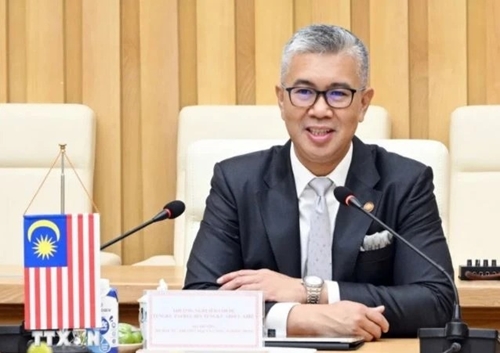In an interview granted to the Vietnam News Agency (VNA)'s resident correspondent in Kuala Lumpur, he highlighted the longstanding friendship between the two integral ASEAN member states and described the elevation of the bilateral relations as the most significant outcome of the visit, with Party General Secretary To Lam and Prime Minister Anwar Ibrahim emphasizing enhanced collaboration in the areas of security, defense, digital economy, and maritime.
    |
 |
|
Malaysian Minister of Investment, Trade and Industry Tengku Datuk Seri Utama Zafrul |
He expressed his confidence that the trip will catalyze greater cooperation between the two countries.
Regarding economic cooperation, he highlighted that the time is ripe for furthering the agenda of the bilateral economic collaboration in multiple domains. He referenced his July meeting with Prime Minister Pham Minh Chinh that helped strengthen Government-to-Government understanding on enhancing trade in existing electrical and electronics (E&E) and chemical industries.
The minister underscored several promising areas for future collaboration, particularly renewable energy where Malaysian firms could join the equipment supply chain, services and investments.
The halal industry and food security, he continued, are also key areas where the two countries can work together in, adding Vietnam’s rapidly increasing middle class provides an opportunity for Malaysia’s food and beverage as well as beauty and personal care producers to access the new market.
In the meantime, Malaysia could provide the platform for Vietnamese companies to tap into the global halal market, which is a high growth industry targeted to be worth more than 5 trillion USD by 2030.
Trade statistics reveal the robust economic relationship between the two nations, with Vietnam ranking as Malaysia's 11th largest global trading partner and fourth within ASEAN in 2023. Bilateral trade reached 17.38 billion USD in 2023, though showing a 10.6% decrease from 19.43 billion USD in 2022. Malaysia's primary exports to Vietnam include E&E products, petroleum products, chemicals, metal manufacturing, and palm oil-based products.
Looking ahead to Malaysia’s ASEAN Chairmanship next year, the minister said the ASEAN 2025, themed “Inclusivity and Sustainability,” reflects the country’s commitment to leading the regional push towards growth that is resilient, inclusive and sustainable for the bloc and beyond.
In practice, this means adopting an all-encompassing approach in developing the ASEAN economy, and ensuring that marginalized groups, such as youths, women and micro, small and medium enterprises reap the full benefit of ASEAN’s overarching objectives.
A key sphere will be developing the digital economy, with particular focus on finalizing the ASEAN Digital Economy Framework Agreement (DEFA) - the world's first regional digital economy agreement. According to Zafrul, DEFA could potentially boost the regional digital economy to 2 trillion USD by 2030, equivalent to an additional 1 trillion USD increase over a business-as-usual trajectory.
He said the agreement will present ASEAN states such as Vietnam and Malaysia a vast potential to capitalize on a lucrative new economy in a seamless and inclusive manner. Besides the obvious boon for trade between ASEAN member states, the spillover effects will be huge for the entire region.
The framework will empower growth for the region in future-proof industries such as generative AI, Data Centers and perhaps most crucially, cybersecurity, he added.
Source: VNA